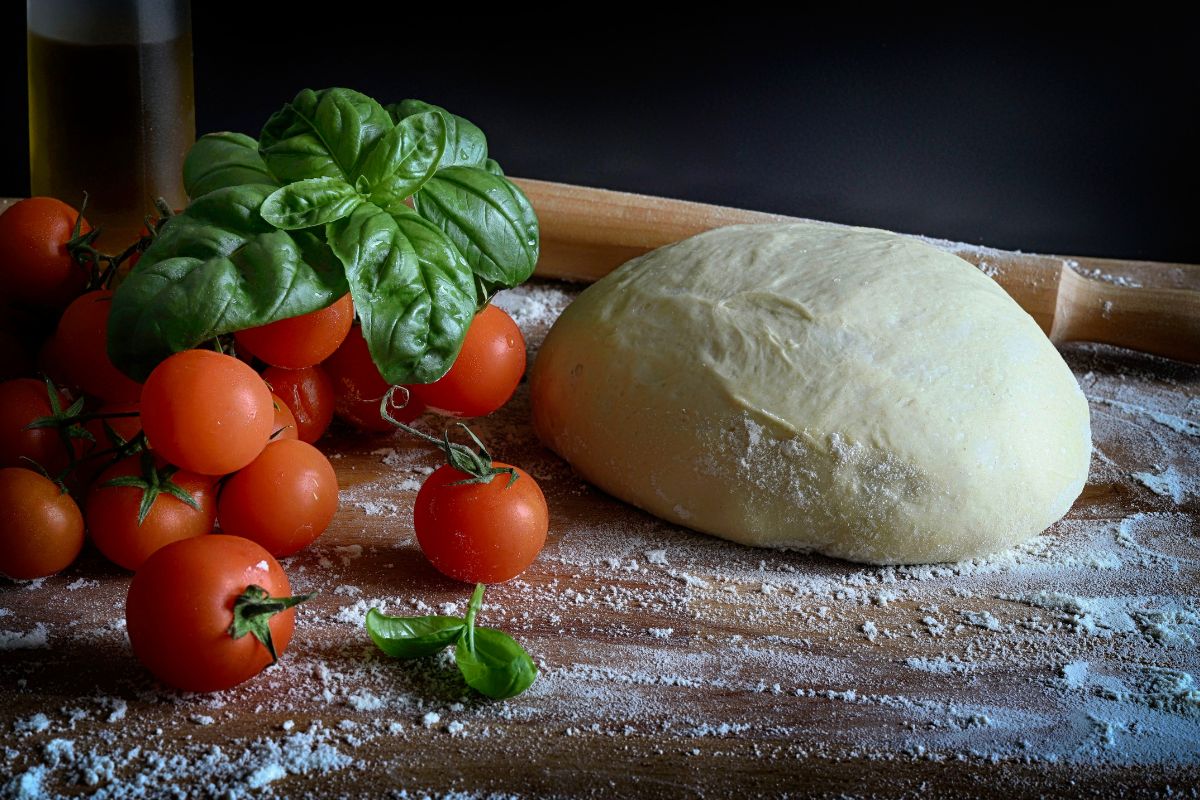No matter what type of dough is left out overnight there is a good chance it will be over proofed.
Especially if your pizza dough is high in yeast and is warm, it is almost guaranteed that the dough will be over proofed when you check on it the following morning.
Luckily, you can stop overproofing when making pizza dough at home! Plus, even if your pizza dough does overproof you can still use your dough to bake a delicious pizza!
In our article we’ll give you some handy tips for leaving your pizza dough out overnight, and when you should avoid doing this when making pizza dough.
But first, let’s get a more in-depth answer to the question – can pizza dough be left out overnight?
How Long Can Pizza Dough Be Left Out?
As long as the pizza dough is a lean dough, it can be left to rest overnight. Still, since the pizza dough will most likely be left to rest for 8 to 10 hours at room temperature, there’s a good chance it will be over proofed.
To stop this from happening, you should store your pizza dough in an environment that is bot too warm and you should be careful how much yeast you use when making pizza dough.
For a great pizza, you should refrigerate pizza dough.
If your pizza dough contains eggs or milk, then you shouldn’t leave it out for more than 2 hours. These foods can spoil very easily at room temperature and you run the risk of bad bacteria developing in the pizza dough.
Pizza dough that contains eggs and milk is also known as rich dough, and you should refrigerate this dough if you don’t plan on baking it for a while.
Pizza dough recipes normally call for flour, salt, water, yeast, and a little bit of olive oil.
While pizza dough can be left out overnight, it isn’t generally recommended to do this, as a cold environment is optimal for pizza dough.
Homemade pizza dough benefits from a longer rise over a few days in the fridge, and if you do this it shouldn’t overproof. The dough becomes tastier and more elastic, which makes it great for pizza.
When Shouldn’t You Leave Pizza Dough Out Overnight?
If Your House Is Warm
For all types of dough to rise over a long period of time without overproofing, it should be stored in a cool place.
Storing pizza dough somewhere warm will speed up the yeast activity, and cause the yeast to consume its food supply quicker. Ultimately, the pizza dough will overproof quicker.
If you let your pizza dough sit overnight in a warm environment, it’s likely going to be over proofed in a couple of hours, leaving you with a dough ball that can’t rise further.
If Your Dough Is Too Thick
The standard ingredients in most pizza dough recipes (flour, salt, water, yeast, and a touch of olive oil) are responsible for making dough lean.
Eggs and milk can spoil at room temperature, and will not react well once they’re combined with pizza dough and left to sit for 8 to 10 hours.
There’s a very good chance these ingredients will spoil, and can actually make you sick if you eat pizza that is made with this spoiled dough.

Advice For Leaving Pizza Dough Out Overnight
If you want to – or you have to – let your pizza dough rest overnight, there are a few things to remember.
So your homemade pizza doesn’t end in disaster, implement these tips before you leave your pizza dough out to rise overnight.
Keep The Dough Cool
You need to reduce the yeast activity to also slow down the dough rise. Temperature plays a huge role in yeast activity, so for a great pizza you should always store your dough in a cold place.
Nights are normally cooler, although this obviously differs depending on your location.
If you can, find a cool place in your house or in an outside building (like a shed) that is pretty cold and store the dough overnight. Storing pizza dough in a shed is particularly beneficial on a cold night.
We recommend putting your pizza dough by a garage door or window for a great pizza.
It’s important to ensure the pizza dough is covered tightly in a container or plastic wrap to prevent it from drying out or getting contaminated.
Reduce The Yeast Content
The more yeast your pizza dough contains, the less time it takes for your dough to rise. Therefore, reducing the yeast content will help slow down the dough rise.
Reducing the yeast content means the yeast consumes the sugars and the starches in the dough over a longer period of time (i.e. overproof), and you should get beautiful dough balls every time.
If you’re letting your pizza dough sit for 8 to 10 hours, then you have to significantly reduce the amount of yeast.
For a great pizza, use less than 1g of yeast per 500g of flour, as this should decrease the rise enough for it to be sufficient for overnight proofing.
However, the temperature has to be just right. If the room is too warm, your dough can completely rise and will be over proofed in about 3 to 5 hours.
Ensure The Dough Is Covered Tightly
As pizza makers, we don’t to check on their pizza dough only to discover that it is dry – or worse – bugs have managed to get into the dough.
This is why it’s so important to make sure your homemade pizza dough is tightly sealed with an airtight container lid or plastic wrap, to keep the air around your pizza dough humid, prevent the dough drying out, and keep your dough safe from creepy crawlies.
Keep Your Dough In The Fridge
If you can’t refrigerate pizza dough for whatever reason – for example, you don’t have enough space – then this will set you back.
Refrigerating your dough is considered the best option for your dough to rise properly, and one you should seriously consider. Refrigerated dough provides consistent results, and reduces the likelihood of overproofing.
Your fridge should also have a stable temperature, so you can rest assured that the rise of the dough will take longer.
Unless you’re confident that you can leave your dough out overnight, or your dough will be fine stored outside the fridge at room temperature, for peace of mind we would recommend you store pizza dough in the fridge.
Final Thoughts
While you can leave pizza dough out overnight, it is very risky unless you have the right temperature conditions to store pizza, and adhere to proper storage practices (such as using an airtight container).
Therefore, for a great pizza that will rise evenly you should store pizza dough in the fridge overnight.










